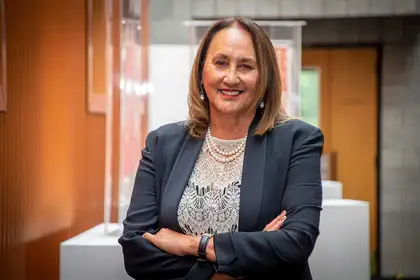
Fulbright New Zealand Scholar Award recipient Professor Huia Jahnke will head to the USA in June to do research on indigenous partnerships with higher education facilities.
A prestigious Fulbright New Zealand Scholar Award will enable a Massey University academic to research partnerships between indigenous communities and higher education institutions in the United States.
The award will allow Huia Jahnke, Ngāti Kahungunu, Ngāti Toa Rangatira, Ngai Tahu, and Ngāti Hine, Professor of Māori and Indigenous Education at Massey University’s Te Pūtahi-a-Toi/School of Māori Knowledge, to explore the kinds of partnerships that could help to advance Māori education goals.
She says that authentic community relationships are important for institutions if they are to remain relevant to their communities.
While in the US, Professor Jahnke will research “the nature of community partnerships in higher education for, with and by indigenous peoples, and exploring how we can describe the relationship between higher education institutions and their indigenous communities.”
She says there are few comparative studies of strategic initiatives, “including the different layers of unseen barriers that continue to challenge indigenous educational ideas and practices in higher education.”
“Institutions in the USA have a long history of community engagement and partnerships – the ‘town to gown’ relations. In Aotearoa New Zealand the idea of such relationships with Māori communities, at least in the university sector, is still evolving as systems, processes and values within institutions adjust to Māori priorities.”
During her six-month project, starting June 2020, she will investigate indigenous community /higher education partnerships at the Salish Kootenai Tribal College in Montana, UCLA in Los Angeles and Columbia University in New York, where she will give a public talk on higher education responsiveness to indigenous aspirations in Aotearoa.
Professor Jahnke says the Fulbright New Zealand Scholar Award will “provide valuable international perspectives for the strategic work I’m involved with at Massey, as well as my teaching, research and wider contributions through membership of national and international committees, organisations and tribal committees.”
“In Aotearoa New Zealand, for example, the Ministry of Education's newly-released discussion document, Shaping a Stronger Education System with New Zealanders, emphasises that what matters most for Māori in the education of Māori learners is for Māori to exercise agency and authority over their learning. This means a genuine partnership approach across the education system is vital to Māori education success.“
Ideas gathered from her Fulbright project will contribute to knowledge that can be applied in her teaching, research and programme development at strategic and operational levels. The project is also an opportunity to set up student, faculty and community exchange programmes between the United States and Aotearoa New Zealand aimed at indigenous education development and priorities.
Professor Jahnke’s research has been included in a newly-released book she initiated and co-edited, Indigenous Education New Directions in Theory and Practice, which captures the work being done by indigenous academics in higher education institutions in Canada, Hawaii, the United States and here.